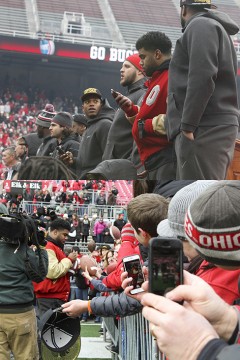
Top: Sophomore running back Ezekiel Elliott looks at his phone while standing with his teamates during a national championship celebration for the Buckeyes on Jan. 24 at Ohio Stadium. Bottom: Fans snap photos of sophomore runningback Ezekiel Elliott as he interacts with fans during a national championship celebration for the Buckeyes on Jan. 24 at Ohio Stadium.
Credit: Kelly Roderick / Lantern photographer
Ohio State’s football team emerged through the synthetic fog, past the torches of fire and into the stadium. Many of the players had their phones in hand, filming the experience. A celebration for a once-in-a-lifetime season, a national title, a stadium full of more than 45,000 cheering fans, and they only saw it through a 4-inch screen.
Over winter break, I went to a The 1975 concert. Like any other concert, dozens of phones obstructed the view of the lead singer. During the band’s hit song, “Chocolate,” he requested that we all put our phones away to “be in the moment.” Some complied, but others could not resist the temptation to take a video during the song, even when Matt Healy, presumably someone they are a fan of, explicitly asked them not to.
We are all guilty of this. We film things and take pictures to show to other people, and in the process, forget to experience it for ourselves. The videos from a concert or other celebration don’t hold a candle to actually being there. Instead of one very memorable experience, you get a distracted real-life interaction coupled with a low-quality video of it. The football players worked hard and earned the right to be celebrated, and you paid for that concert ticket and made the time and effort to be there. Is it not enough to have the memory, without the digital proof?
Monday morning at 10 a.m. I got an email advertising an app that claims to allow you to anonymously talk to your crush and reveal your identity later. This sounds like an episode of “Catfish” waiting to happen. Host of the MTV show Nev Schulman wrote about living in the digital age in his 2014 book, “In Real Life.”
“There are so many ways to be friends online that the idea of just going to grab a coffee with someone feels downright archaic. Why do we like these social media platforms so much more than the old system of telephones and paper and meeting in person? … It’s because online we don’t have to deal with the awkwardness of real-time interactions and rejections; we feel safer behind the screen,” he wrote.
And he’s right, face-to-face interactions can be downright uncomfortable. In fact, it’s even become somewhat of a trend to tweet about how “socially awkward” one is.
But are we all so afraid of feeling uncomfortable, even for a minute, that we will avoid face-to-face interaction at all costs?
Advances in technology have produced countless new ways of interaction. We need to recognize that along with the great advances have come setbacks. Complaining about how the way we communicate has changed, that “technology is ruining our society,” or ironically, tweeting about it, isn’t going to help. Each generation has had obstacles to overcome, and ours has to do with communication. Consider a card instead of an Instagram collage, a phone call instead of a text and look with your eyes, not with your phone camera lens.


